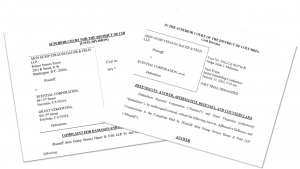 Editor’s note: This is a guest post by Mark Stodder, President of Xcential Legislative Technologies. As I reported here in November, the law firm Akin Gump Strauss Hauer & Feld has sued Xcential for misappropriation of trade secrets, breach of contract, and other causes of action. This is Stodder’s perspective on the lawsuit. If anyone at Akin Gump wishes to respond, I would be happy to publish it.
Editor’s note: This is a guest post by Mark Stodder, President of Xcential Legislative Technologies. As I reported here in November, the law firm Akin Gump Strauss Hauer & Feld has sued Xcential for misappropriation of trade secrets, breach of contract, and other causes of action. This is Stodder’s perspective on the lawsuit. If anyone at Akin Gump wishes to respond, I would be happy to publish it.
 Mark Stodder
Mark Stodder
The Goliath is the Washington, D.C.-based “Biglaw” firm of Akin Gump Strauss Hauer & Feld – the federal lobbying powerhouse that last year, according to Open Secrets, earned nearly $54 million in revenues from helping clients sway Congress and the federal government, work that includes drafting and amending federal legislation.
This Goliath has stepped forward and filed multiple actions against us, first at the U.S. Patent and Trademark Office and then in D.C. Superior Court, to claim an Xcential invention as its own and to throttle us for, among other allegations, misappropriation of trade secrets. At great cost, Xcential has been forced to defend itself with counterclaims and motions for dismissal. This unwarranted and burdensome expense has not only been extremely stressful to all of us at Xcential but represents a looming threat to our business.
We know the Biblical story (and how that turned out), but change the venue to a courtroom and the USPTO and things get a little murky.
Why would this Goliath care so much about this David?
First, the context.
Legislative AutomationThe details and the arguments from both sides are publicly available and have been covered by the National Law Journal, the legal tech media and, most recently, experts in the patent world. A quick summary: at issue is Xcential’s 2019 patent application for a software invention we call “Bill Synthesis” (or, as filed, “System and Method for Document Extraction and Synthesis”). Xcential’s invention was based on two of our existing technologies: “Change Sets” software (U.S. patent application in process); and another internal technology we call “Snapshot,” both of which are built into and rely on our LegisPro bill drafting software. What’s particularly important about the invention is that it can automate some of the more complicated, time-consuming and error-prone steps for drafting a federal bill.
Bill Synthesis, Snapshot and Change Sets were developed out of our decades of experience with legislatures and with Congress. The inventor, Xcential CEO/CTO and co-founder Grant Vergottini, has been working with legislative attorneys – the professional bill drafters inside government – since the early 2000s, watching and absorbing every detail of their highly specialized and critically important work. Grant has also worked with many different styles of amending the law and creating legislation around the world and has observed the pain points created by complex traditions and legacy technology. This extensive education has led him to conceive of, develop and implement software to make those processes work more efficiently, with greater accuracy and transparency.
Among the most complicated styles of bill drafting is the U.S. federal “cut and bite” style – meaning a bill will consist largely of out-of-context line-by-line changes to the law (“Section 55(b)(1) is amended by striking so much as precedes subparagraph (A) and inserting the following…”), instead of redline “amend in full” changes that allow you to see exactly how the law may be amended. The cut-and-bite style has always been a challenge for federal drafters. We know this from our many discussions with them and others in legislative circles about how to create those documents more efficiently – even automatically.
Automation technology for creating amending documents from redlines has been around for a long time, but LegisPro’s Bill Synthesis software, combined with our Change Sets and Snapshot, provides a way to mark up federal law as you’d redline any document in context and then automatically convert those redlines into the cut-and-bite style of a federal bill. Dreaming up such an efficient solution is one thing; writing the code to enable it was much more challenging, but in 2019 Vergottini did it. When we demonstrated a prototype of our invention to drafters, their excitement was palpable. This invention is a big deal.
And, apparently, it’s a big deal for Akin Gump.
Such a big deal that Akin filed an extremely rare “Petition for Derivation” at the USPTO last March in an attempt to claim ownership of our invention. As our application awaited action from USPTO examiners, Akin Gump filed suit against us in D.C. Superior Court in October. More recently, the night before Thanksgiving, it filed a preliminary injunction to attempt to halt the USPTO process. We now have multiple court dates on our calendar in the new year.
The Holy Grail?Akin Gump claims one of its attorneys, Louis Agnello, is the actual inventor of Bill Synthesis. According to their court filing, one summer afternoon in 2018, Agnello thought up the idea of creating a federal cut-and-bite style bill from redline changes to the law, allegedly telling associates it would be the “Holy Grail” of federal legislative drafting, and “forever change the complex process of drafting federal legislation.”
 The software invention, however, involves highly complicated interactions of XML technology with our LegisPro editor, a browser-based application. Agnello, who drafts bills and amendments for Akin Gump’s clients, and who worked for a time on The Hill, doesn’t mention any technical background in his law firm bio or LinkedIn profile – no expertise in XML technology, no mention about working with internal XML data structures or JavaScript coding, nothing about creating complex algorithms or the technology that’s behind LegisPro’s Change Sets application, which Bill Synthesis is built on. There is no shame in not having software-coding skills, but they are essential to creating the kind of software that Agnello now claims he invented.
The software invention, however, involves highly complicated interactions of XML technology with our LegisPro editor, a browser-based application. Agnello, who drafts bills and amendments for Akin Gump’s clients, and who worked for a time on The Hill, doesn’t mention any technical background in his law firm bio or LinkedIn profile – no expertise in XML technology, no mention about working with internal XML data structures or JavaScript coding, nothing about creating complex algorithms or the technology that’s behind LegisPro’s Change Sets application, which Bill Synthesis is built on. There is no shame in not having software-coding skills, but they are essential to creating the kind of software that Agnello now claims he invented.
Xcential met with Agnello in the fall of 2018 when, as detailed in the court filings, he contacted us to inquire about our bill drafting software. A series of calls and meetings and demonstrations of our software to Agnello and others at Akin Gump ensued over the next many months and into 2019. Eventually Vergottini, who, as noted above, had been working on amending technology for decades, built a prototype enhancement to LegisPro that showed the Bill Synthesis functionality (coupled with Change Set and Snapshot). He showed this not only to Agnello, but also to other government bill drafters we’d been working with on The Hill.
Agnello’s reaction? “Holy —!”
He declared this would lead to a “K Street parade.” Apparently, Grant Vergottini had unearthed the “Holy Grail.” Or so Agnello told us.
Surprisingly, despite his over-the-top enthusiasm, this chapter of our David and Goliath story ended here. After the sales demo, Xcential proposed building and licensing a custom version of the application for Akin Gump (at a cost amounting to a small fraction of the annual revenues from just one of Agnello’s nearly two dozen federal lobbying clients). The proposal, however, was rejected, Agnello told us, as too costly.
Xcential was disappointed, but after investing many hours and dollars to build the demo, and after disclosing our trade secrets and confidential information to Akin Gump (under a EULA and mutual NDA), Xcential wasn’t about to walk away from our invention. Vergottini made his application for a patent for the Bill Synthesis software he’d created and, as happens with patent applications, we settled in for the long wait to hear from an examiner.
Instead, we heard from Akin’s lawyers. Here comes Goliath.
Why?Why is our technology for federal bill drafting so important to Akin Gump that it’s inspired a rare patent action and multiple lawsuits and motions in court – the cost of which, by now, must far exceed what Akin would have spent on Xcential’s “too costly” original licensing and development proposal? What makes it a “Holy Grail” worth potentially crushing a tiny LegalTech innovator from a California beach town?
Why would Akin resort to the laughable claim that Agnello was the actual inventor of Bill Synthesis technology? As Vergottini put it, “For Agnello to claim this invention is like saying, ‘If we had a rocket we could go to Mars,’ and then suing the rocket scientists who built it for the design patent.”
First, there’s what called, “The Cream.”K Street lobby firms generally charge their clients on a flat fee or retainer basis. Retainers can start in the low thousands per month and run well beyond $50,000. (According to OpenSecrets.org, in 2021, ZTE Corp, the Shenzhen-based telecom provider fighting federal trade violation accusations, which lists Louis Agnello as their lobbyist, averaged $100,000 per month in spending with Akin Gump; the 23 clients showing Agnello as registered lobbyist spent nearly $6.2 million on federal lobbying with Akin Gump last year). While customers are billed a flat fee, most lobbying firms carefully track the time their teams spend on each client and measure those costs against the retainer amount. The difference between the retainer and those costs is, obviously, the profit – or “The Cream,” as it is sometimes called.
Use Xcential’s Bill Synthesis software to dramatically cut the hours spent using Word to draft those complicated cut-and-bite bills, and you squeeze a whole lot more “cream” from your clients. Having to pay the technology firm that invented this invaluable shortcut would only drain off some of the cream.
And then there’s the competition.K Street is the most competitive street in Washington, with extraordinary amounts of money at stake. Politico’s rankings of federal lobby firm revenues showed Akin Gump in second place in 2021 ($53.4 million), edged out by Brownstein Hyatt ($56.3 million). In the most recent 2022 reporting, Brownstein maintained the top position on K Street, leaving behind Akin Gump at number two and Holland & Knight (the firm now representing Xcential in D.C. Superior Court) in third.
What if one firm on K Street completed its legislation drafts more efficiently and faster than the others?
LegisPro, with its Bill Synthesis technology, has the potential to dramatically cut the time it takes for a bill draft or amendments to get to The Hill for consideration and to deliver it in the proper XML data format. If Akin owned the Bill Synthesis software patent, it could have a distinct edge over other K Street firms in getting its bills to the Hill ahead of the pack. If Xcential retains the patent for its invention, we could license the application to every lobbyist on K Street.
And what about their clients?
Corporations and trade associations are always evaluating and reevaluating how to pursue their governmental relations interests. Do they pay that big retainer to an outside lobby firm, or do they take some or all of the work in-house?
Xcential could help these associations and company in-house counsel do just that. LegisPro and its Bill Synthesis can simplify drafting those complicated cut-and-bite bills. Vergottini’s invention makes it as simple as working in Word – but with powerful structured-data technology. That’s why it’s the “Holy Grail.” Might that tip the decision toward relying more on an in-house lobbying team – and away from hiring Biglaw lobby firms like Akin?
Taking aimProfits and competition. Throughout time, they have caused Goliaths to behave ruthlessly.
For Xcential, it has been extremely stressful, financially and emotionally, to play the role of David in this drama. Everyone roots for the underdog, but nobody chooses to be one. We must and will continue to combat their claims, not only for Xcential’s sake, but also for the sake of other inventors – especially those in the LegalTech world – who could also face becoming collateral damage in a similar power grab.
So we load our sling with the smoothest stone we can find, and hope our aim is true.
Mark Stodder is President of Xcential Legislative Technologies. For more about Xcential: www.xcential.com.